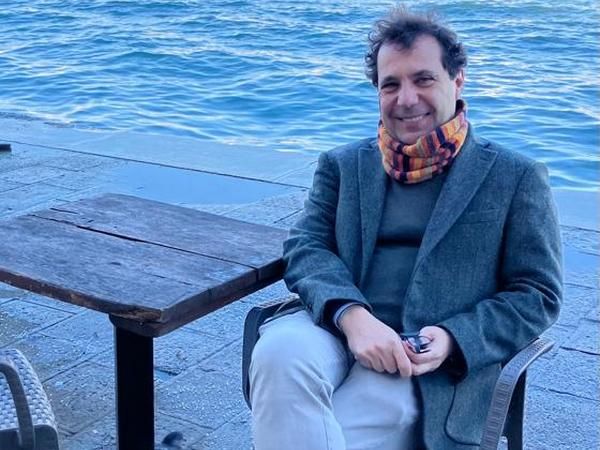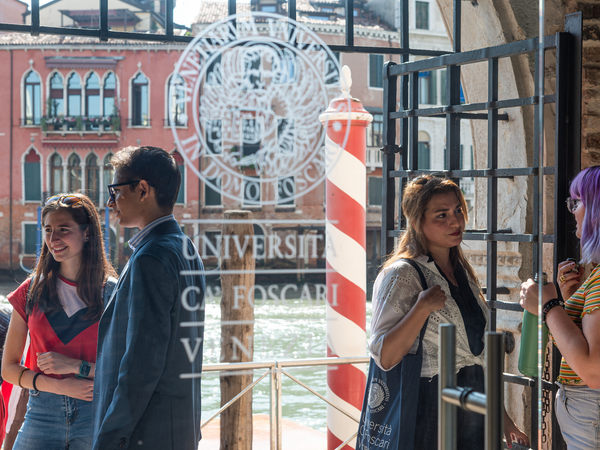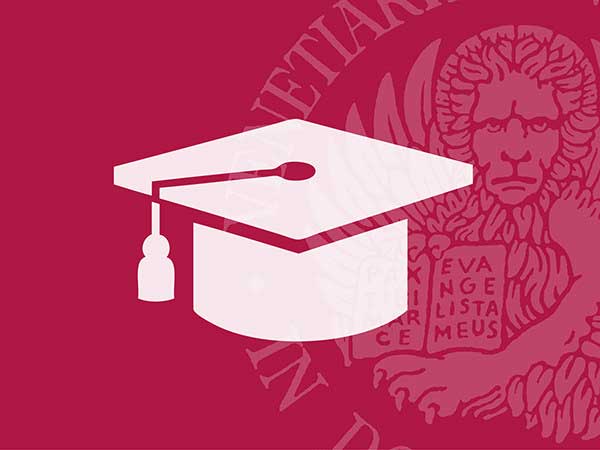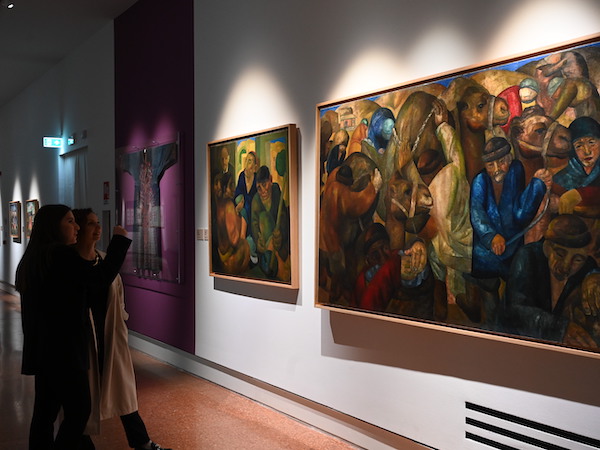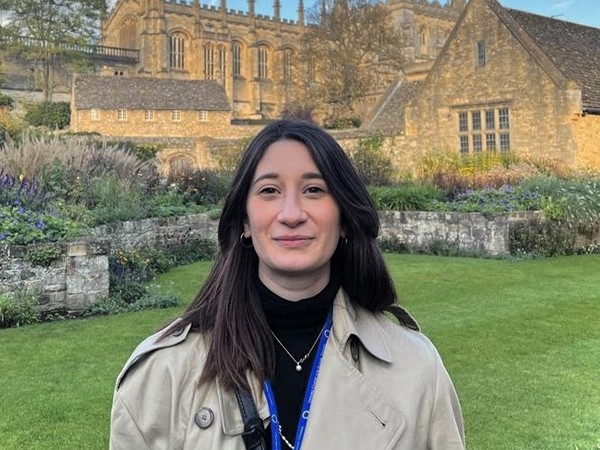Massimo Ciaravolo was awarded the 2023 Swedish Academy Prize for the dissemination of Swedish culture abroad. The Prize, amounting to SEK 80,000, will be awarded on 20 December.
The Nobel Academy for Literature recognised Ciaravolo's outstanding role in introducing Swedish culture and literature abroad through his research and teaching at our university.
Massimo Ciaravolo, born in 1964 and living in Milan and Venice, is an author, editor and translator. He has been working as an associate professor of Scandinavian languages and literature at Ca' Foscari University of Venice since 2017.
Ciaravolo has translated, among others, Katarina Frostenson, Tua Forsström, Ulf Peter Hallberg, Hjalmar Söderberg and August Strindberg. His works include Den insiktsfulle läsaren. Några drag i Hjalmar Söderbergs litteraturkritik (1994: The Sharp Reader. Aspects of Hjalmar Söderberg's literary criticism) and En ungdomsvän från Sverige. Om mottagandet av Hjalmar Söderbergs verk i Finland 1895-1920 (2000: A childhood friend from Sweden. On the reception of Hjalmar Söderberg's work in Finland from 1895 to 1920). His latest book Libertà – gabbie – vie d'uscita (Freedom - cages - ways out), published in 2022 by Edizioni Ca' Foscari in both print and open access edition (you can download it here), brings together studies on modernity in Henrik Ibsen, Herman Bang, August Strindberg, Sigbjørn Obstfelder and Sophus Claussen.
Ciaravolo is also the editor and co-author of Storia delle letterature scandinave (History of Scandinavian Literature, Iperborea, Milan 2019) and has written extensively on the flâneur, Swedish working-class literature, and on the literature of migration and post-migration.
On the occasion of the award, we interviewed him.
This prestigious award rewards the dissemination of Swedish culture abroad. How did your interest in the Swedish language start and how did it develop over time, to the point of making you a popular teacher and well-known translator of Swedish authors?
In the seventies, while in middle school, I fell in love with the study of the English language and further developed my passion for languages in high school, where I also took up German. In high school, I also discovered the pleasures of literature, at the time mainly English and German. I have liked geography since a teenager, and I remember being given an assignment on Sweden and its welfare state. It may sound strange now, but Olof Palme and social democracy - as a vision of a social and political reality different from our own - fascinated me then, and still do now. The turning point came in 1984, during my first year at university in Milan, when I was studying Foreign Languages. Swedish was an option, and I chose it as my third language, which then became the main subject in my second year, to the displeasure of my mother. Love is for the senses, and the sound, the materiality of the Swedish language struck me to the heart. It all started from there: travel, language courses, scholarships, theses, translations, research and teaching.
Is Swedish culture well-known in Italy today? What are its modern aspects, and what traits are still unknown?
If we talk about literature, a lot of ground has been covered since the 1980s. In that decade, the publishing house Iperborea began operating in Milan, acting as a driving force for large, medium and small publishers, in that it encouraged them to offer an increasingly broad and diverse spectrum of genres, voices and trends in translation. One aspect of modernity is the ability to deal on the one hand with strong, topical themes that are universal (the relationship with the environment and the non-human, the dynamics of couples and families, the universe of children, the welfare state, contemporary migrations, just to give a few examples) and on the other hand to delve into themes that are strongly rooted in a given landscape, a given climate and a given cultural and spiritual tradition: a belief in storytelling and the search for meaning through words, despite everything.
In our culture today, Swedishness is not only, and perhaps not primarily conveyed by literature. Almost all of us buy furniture and other house goods in well-known shops that basically turned Sweden into a brand. I try to teach my students the cultural assumptions behind that idea of living, starting with the funkis (functionalism) of the 1930s and, further back in time, the peasant and Lutheran background.
Are there any contemporary Swedish authors who are still not popular in Italy and would be worth discovering? Perhaps you could give us a suggestion for an original Christmas gift?
I suggest three living authors. Sara Stridsberg's novel The Gravity of Love (La gravità dell'amore, Mondadori) has changed the original title which was Beckomberga, from the name of Stockholm's largest psychiatric hospital, closed in 1995. The subtitle reads: Ode till min familj (An ode to my family). It is partly an autobiographical story about a dysfunctional family, but also about the extended family that the child protagonist finds in Beckomberga while visiting her father and, by metonymy, about the family as a 'home for all the people' (including the people in mental distress) that was the utopia of the Swedish welfare state. Kerstin Ekman's novel Varulven (To be a Wolf, Essere lupo, Iperborea) tells the story of a former hunter and retired forestry inspector, whose encounter with a wolf triggers something different, a change in his perspective on the relationship between man and animal, traditionally based on domination. Elisabeth Åsbrink does not write novels, but her essays have great literary quality. Her book Made in Sweden (Iperborea), originally ' Orden som formade Sverige', The words that made Sweden, is now a textbook for my students: short chapters on key words, dates and characters that make up 'Swedishness' today, including, of course, the founder of the well-known furniture industry.
I can't wait for Åsbrink's book on the writer Victoria Benedictsson to be published by Iperborea. Benedictsson was a contemporary of August Strindberg but is still unknown in Italy. She is a great little classic worth discovering, and I hope Åsbrink's new book in translation will facilitate this.
What is the state of Swedish language teaching in Italy and at Ca' Foscari in particular?
Swedish is the most commonly taught Scandinavian languages. Courses in Swedish are offered in all six Italian universities where you can take Scandinavian Studies (from the oldest to the most recent curriculum: Rome, Naples, Florence, Milan, Genoa, Venice). At Ca' Foscari, after the great work that was done by our colleague Massimiliano Bampi from 2006 to 2018, Sara Culeddu and I picked up his legacy and have expanded the offer both within the Bachelor's Degree in Language, Civilisations and the Science of Language, and at Master's Degree level, where we work with three degree programmes (European, American and Postcolonial Languages and Literatures, Language Sciences and Environmental Humanities). The Swedish language assistant, Dr Annette Blomqvist, is a pillar and point of reference for our four classes (three for the Bachelor's degree and one for the Master's). We have a good number of students each year, and several graduates have already found a job after their Master's. We would like to bring in more Scandinavian languages and grow as a centre for Scandinavian studies. My colleagues (Sara Culeddu, plus Martina Ceolin who teaches Germanic Philology) and I have a good knowledge of Danish, Norwegian and Icelandic, too. Time will tell whether this project will come to fruition.





